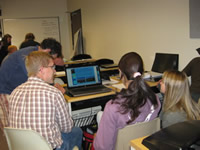- Home
- Program Schedule
- Poster Presentations
- Speakers
- Photos
- Registration
- Travel Information
- Press Room
- Contact Us
Program
Anticipated Workshop Outcomes
 Identification of important partners, collaborators, users and possible funding agencies for Nevada’s new climate change capabilities. The workshop will serve as a platform to launch collaborations on multiple tracks.
Identification of important partners, collaborators, users and possible funding agencies for Nevada’s new climate change capabilities. The workshop will serve as a platform to launch collaborations on multiple tracks.- Engage stakeholders to frame important questions for investigations, pooling information and development of a plan for on-going dialogue among scientists, stakeholders and decision makers.
- Clear understanding of how EPSCoR infrastructure can be highly beneficial for stakeholders and be incorporated in regional and national research and monitoring programs.
- New research collaborations and better coordination among the Tri-State EPSCoR and other scientists
- Vision document, identification of key issues and how to address them in a collaborative manner in future proposals.
- A workshop summary that will highlight outcomes and serve as a directory for future stakeholder engagement and collaboration.
Sheep Range Tour
The tour will visit the NevCAN Sheep Mojave Desert Shrub monitoring station north of Las Vegas within the FWS Desert National Wildlife Refuge. During the tour, you will be provided information about the NevCAN goals and instrumentation as well as webcam access to all NevCAN station locations. Participants are asked to wear comfortable clothing. Sunscreen, hats, sunglasses and stable, closed-toe walking shoes are highly recommended. Water will be provided. The tour involves an approximate ½ mile easy walk (one way) from the parking lot to the station along a desert trail with a very mild slope. March 26, 2013 Sheep Range Tour
Click here to view pictures from the Sheep Range Tour
AGENDA
Provisional Agenda (Download PDF)
Climate Change Science for Effective Resource Management and Public Policy in the Western United States
Provisional Agenda
March 27-28, 2013
University of Nevada Las Vegas
Day 1 – March 27, 2013
8:00 am - 4 pm |
Poster installation |
7:30 – 8:30 am |
Registration |
8:30 - 9:00 am |
Welcome |
9:00 – 9:45 am |
Plenary Session #1 |
9:45 - 10:15 am |
Break |
10:15 – 11:00 am |
Plenary Session #2 |
11:00 am – 11:45 pm |
Plenary Session #3 |
| 11:45 am ‐ Noon | Plenary Session #4 Introduction to Topical Areas andGoalsforDiscussionGroups Participants – Topical Area Conveners(Scott Mensing,Helen Neill,Donica Mensing) Questionsto participants: 1) Do you consider climate change when performing your job? (show of hands) 2) How do you define climate change? (show of hands and ask a few fortheir definitions) |
Noon – 1:00 pm |
Lunch |
1:00 – 2:30 pm |
|
1:00 – 2:30 pm |
|
1:00 – 2:30 pm |
|
2:30 – 2:45 pm |
Break |
2:45 – 4:15 pm |
|
2:45 – 4:15 pm |
|
2:45 – 4:15 pm |
|
4:15 – 4:40 pm |
Break |
4:40 – 5:15 pm |
Plenary Session #5 |
5:15 – 5:30 pm |
Break |
5:30 – 7:00 pm |
Poster Session |
Day 2 – March 28, 2013
8:30 - 9:30 am |
Plenary Session #6 Plenary Speaker: Climate adaptation through collaborative modeling: Examples from acequia communities, Rio Grande and the Western Interconnection |
9:30 – 9:45 am |
Poster Session Awards & Session Breakout Instructions |
9:45 – 10:30 am |
Break |
10:30 am – noon |
(Questions will be developed during Day 1) |
10:30 am – noon |
(Questions will be developed during Day 1) |
10:30 am – noon |
(Questions will be developed during Day 1) |
12:00 pm – 1:15 pm |
Lunch |
1:15 – 3:15 pm |
Plenary Session #7 |
3:15 – 3:30 pm |
Closing |


